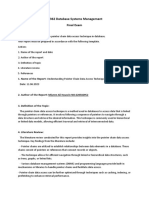0% found this document useful (0 votes)
15 views11 pagesPlacement 50 Python Solutions
The document contains 50 common coding questions with concise Python solutions, covering a variety of topics such as number manipulation, string processing, data structures, and algorithms. Each question includes an example of usage to illustrate the solution. The solutions are designed to be runnable and provide a practical approach to common coding challenges.
Uploaded by
navin.verma262Copyright
© © All Rights Reserved
We take content rights seriously. If you suspect this is your content, claim it here.
Available Formats
Download as DOCX, PDF, TXT or read online on Scribd
0% found this document useful (0 votes)
15 views11 pagesPlacement 50 Python Solutions
The document contains 50 common coding questions with concise Python solutions, covering a variety of topics such as number manipulation, string processing, data structures, and algorithms. Each question includes an example of usage to illustrate the solution. The solutions are designed to be runnable and provide a practical approach to common coding challenges.
Uploaded by
navin.verma262Copyright
© © All Rights Reserved
We take content rights seriously. If you suspect this is your content, claim it here.
Available Formats
Download as DOCX, PDF, TXT or read online on Scribd
/ 11





















































































